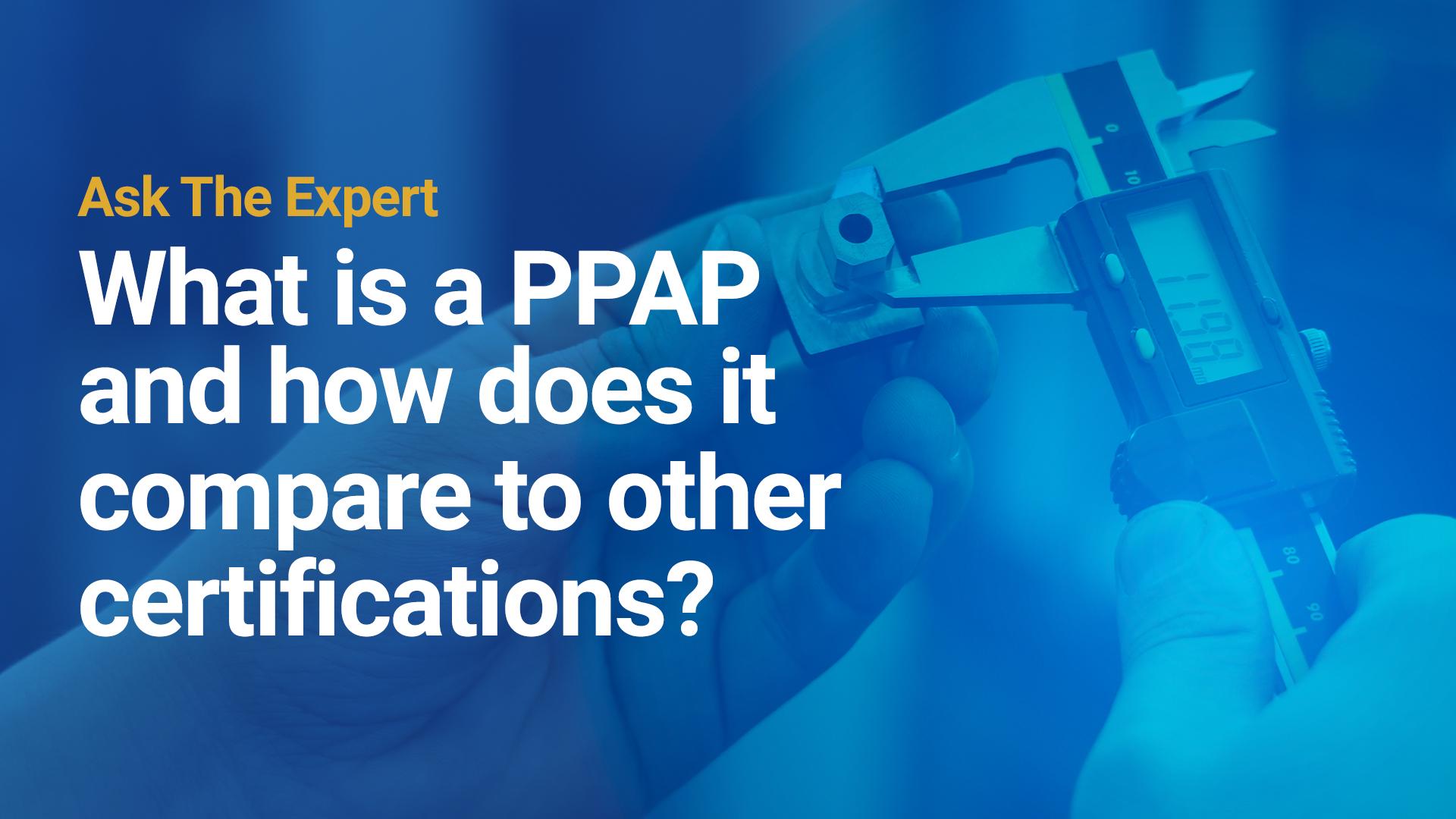
What is a PPAP and how does it compare to other certifications?
Many customers will request a “cert” (certification) when ordering fasteners. The term “cert” can have different meanings from one customer to another. In the fastener industry, the most comprehensive cert that can be requested is called a PPAP (pronounced P-PAP). Providing a cert that meets the PPAP requirements ensures the customer that the supplier understands all the design specifications and requirements that are needed to meet the customer's part requirements and that they are capable of consistently supplying product that meets the quality requirements.
PPAP – Production Part Approval Process
The requirements for a PPAP cert have been established by the Automotive Industry Action Group (AIAG), and this type of cert is commonly requested in the automotive, heavy truck, and construction equipment industries. A PPAP is the most stringent type of certification (and the most expensive). A PPAP cert must review 18 different elements in the manufacturer and inspection process. These 18 elements cover all aspects of the fasteners' production from:
• The raw material used to make the part
• The equipment the part will be manufactured with
• The dimensional tolerances the equipment can maintain
• The inspection processes used to verify the parts meet the drawing or specification
• The physical properties of the fastener
• The plating or coating process
There are five “levels” of PPAPs that can be requested by the customer. The level number refers to the amount of information that the customer is requiring to have supplied to them within the cert package. No matter which level is requested by the customer, all the steps of a PPAP must be reviewed, documented, and retained by the supplier.
• Level 1: The Parts Submission Warrant (PSW) is supplied
• Level 2: The PSW with product samples and any documents requested by the customer
• Level 3: The PSW with product samples and all supporting documents
• Level 4: The PSW and any testing requested by the customer
• Level 5: The PSW with product samples and documentation is available for review at the manufacturer's location
The PSW is the first page of the PPAP cert package that must be signed by the supplier, and approved by the customer, verifying that all elements of the PPAP process have been reviewed and meet the customer's requirements.
A Level 3 PPAP is the most common level specified. This level requires that all the test documentation along with samples are submitted to the customer for approval prior to supplying the product. Once a PPAP has been approved, the supplier must use the same equipment and processes to make the parts in each shipment. Any change in equipment, process, or supplier requires that a new PPAP is submitted for approval.
Having an approved PPAP ensures the customer that the parts will meet their quality requirements and that all future shipments will be manufactured using the same processes. From the supplier's standpoint, having an approved PPAP'ed part ensures that all future shipments will be ordered from them. A constraint of the PPAP process, for the supplier, is that, because of the comprehensive approval process required, a PPAP is carried out on a production run of the parts (usually requiring a relatively large initial order quantity) and the supplier must use the same manufacturing and inspection process on all future orders.
There are other types of certifications that a customer can request. In the fastener industry, when a cert is requested, suppliers (that are able to provide certs) will typically provide what is commonly called a certified material test report (MTR). An MTR will typically contain the information that is required by the Fastener Quality Act (FQA). Remember that the FQA only requires that certs are available for each lot of heat-treated and grade-marked fasteners, so certs are not available on every style of fastener. At Earnest, we offer MTRs for all heat-treated and grade-marked products and we maintain these certs in our document imaging system. We can provide these certs with each order or supply the certs at any time your customer requests them, eliminating the need for you to store these certs in your own document system.
Listed below are common types of certs that can be requested.
CofC – Certificate of Conformance (or Compliance)
This is a statement that the product being supplied meets the customer's (or industry) specifications. No actual dimensions or physical properties need to be reported. The Earnest packing slip is a CofC and identifies the size and strength level of the fastener we are supplying.
MTR – Material Test Report (also known as an Inspection Report, Test Report, or Chem-Phys Report)
Lists the material used to manufacture the parts and the results of the physical properties of the product. This type of test report typically does not provide dimensional results. The Fastener Quality Acts requires that MTRs are available for each lot of grade-marked and heat-treated product and are to include the chemical analysis of the material used to make the part and the results of any physical testing (hardness, proof load, tensile).
Plating Cert
The most common style of Plating Cert reports the type and thickness of the plating material that was applied. Some customers will specify that the results of salt spray testing and the time and temperature of a bake-out operation for hydrogen embrittlement should be included.
ISIR/FAIR – Initial Sample Inspection Report or First Article Inspection Report
An ISIR/FAIR cert is typically requested the first time an item is supplied to a customer. This report provides the dimensional and physical properties of the product. When an ISIR or FAIR is provided, it does not restrict the supplier to just one specific manufacturer, only that the parts are made to the same specifications.
